| Srl | Item |
| 1 |
ID:
081542
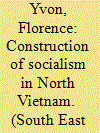

|
|
|
|
|
| Publication |
2008.
|
| Summary/Abstract |
This paper examines the process of transformation of domestic trade in the early independent Democratic Republic of Vietnam, focusing on the grain sector. It argues that, after the severe food crisis of the spring of 1955, the regime called for structural changes and tried to establish a predominant socialist trade system, without however resorting to a state monopoly, but failed to implement the new institutions of socialist trade. The study further shows that this failure, together with other domestic policy issues, compelled the leaders of the DRV to tolerate de facto until about the second half of 1959 a modus vivendi between the state grain sector and the private economic actors. It also demonstrates that these institutional arrangements and innovative procurement policies were in fact quite successful: the food supplies, sold through the public distribution system and the market channels, were on the whole adequate; and the state procurement of paddy increased noticeably. However, because of heated debates in the Political Bureau, partly due to the failure of the state policy, this compromise came to an abrupt end in April 1959 and was followed by a rapid and drastic shift towards the construction of socialism. As a result, private trade had practically disappeared by the end of 1960.
|
|
|
|
|
|
|
|
|
|
|
|
|
|
|
|
| 2 |
ID:
133111
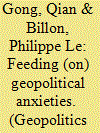

|
|
|
|
|
| Publication |
2014.
|
| Summary/Abstract |
This paper analyses the role of news media in (re)producing geopolitical narratives of food insecurity in relation to the 2007-2008 global food price spike. News content and textual analysis suggests that the media's representation of the food price spike is partly framed by Western geopolitical anxieties of the 'threatening rise of Asia', and features 'fast growing' Asian appetites among the main culprits of the crisis. Seeking to explain the widespread circulation of such representation, this paper analyses media-source relationship within the context of market-driven journalism, and suggests that the changing role of news media has in turn contributed to a rapid and uncritical circulation of elite-based interpretation of, and neoliberal geopolitical approach to, food security. The paper points at the importance of critical enquiries into geopolitical representations of food insecurity and of opening media space for a 'counter-geopolitics of food security'.
|
|
|
|
|
|
|
|
|
|
|
|
|
|
|
|
| 3 |
ID:
086811
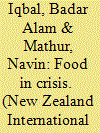

|
|
|
|
|
| Publication |
2009.
|
| Summary/Abstract |
The world is witnessing a food crisis. Surging food grain prices and worsening world supplies are now bringing the food crisis to the boil.The worst affected are the developing economies and least developed economies of the African continent.
|
|
|
|
|
|
|
|
|
|
|
|
|
|
|
|
| 4 |
ID:
091801


|
|
|
|
|
| Publication |
2009.
|
| Summary/Abstract |
The world is facing the worst food crisis since the 1970s. According to the UN Food and Agriculture Organisation (FAO), about 862 million people are afflicted with hunger and malnutrition.
|
|
|
|
|
|
|
|
|
|
|
|
|
|
|
|
| 5 |
ID:
090211


|
|
|
|
|
| Publication |
2009.
|
| Summary/Abstract |
Most official analyses of the recent food price crisis have focused on the market fundamentals of supply and demand for food as key explanatory factors. As a result, most of the policy recommendations emanating from the major international institutions include measures to boost supply and temper demand. In this paper I argue that international macroeconomic factors played a key role in fostering both price volatility and vulnerability, and as such they need to be recognised. With respect to the recent price volatility, the weak US dollar and speculation on agricultural commodities futures markets greatly influenced agricultural prices. With respect to price vulnerability, global economic forces played an important role in dampening production incentives in the world's poorest countries over the past 30 years, leading to a situation of food import dependence. Policy responses to the food crisis must consider the role of these broader international macroeconomic forces-both in the immediate context and their longer term impact.
|
|
|
|
|
|
|
|
|
|
|
|
|
|
|
|
| 6 |
ID:
094326
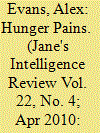

|
|
|
| 7 |
ID:
104993
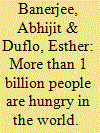

|
|
|
|
|
| Publication |
2011.
|
| Summary/Abstract |
For many in the West, poverty is almost synonymous with hunger. Indeed, the announcement by the United Nations Food and Agriculture Organization in 2009 that more than 1 billion people are suffering from hunger grabbed headlines in a way that any number of World Bank estimates of how many poor people live on less than a dollar a day never did.
|
|
|
|
|
|
|
|
|
|
|
|
|
|
|
|
| 8 |
ID:
121956
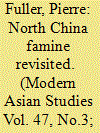

|
|
|
|
|
| Publication |
2013.
|
| Summary/Abstract |
This paper makes the case that in China's most severe food crisis of the first quarter of the twentieth century-the great north China famine of 1920-1921-considerable life-saving relief was generated by three largely-neglected segments of Chinese society: Buddhist and other native charity efforts working along parallel social channels to the better-publicized missionary and international relief groups; the Republic's much-maligned military establishment; and officials and residents of the stricken communities themselves who were operating largely 'below the radar' of the distant, mostly city-based chroniclers of the famine whose voices have been privileged in the later history-writing process. Despite the recent fall of the Qing and the beginnings of a fractured era of warring between provincial governors, this paper suggests that communities in the increasingly neglected periphery of 1920 north China were significantly more viable and attentive to social welfare needs than has been previously recognized.
|
|
|
|
|
|
|
|
|
|
|
|
|
|
|
|
| 9 |
ID:
091908


|
|
|
| 10 |
ID:
190039


|
|
|
|
|
| Summary/Abstract |
In 2022, Ferdinand Marcos Jr., the son and namesake of the late dictator, won a landslide victory in the presidential election after campaigning largely on nostalgia for the Philippines’ authoritarian past and perceived former greatness. The country was finally able to reopen from COVID-19 lockdowns after enduring a surge in the Omicron variant in the earlier months of the year. Global food and energy inflation, caused by excessive fiscal spending and monetary easing adopted during the pandemic, in addition to the aftershock of Russia’s invasion of Ukraine, has led to an unprecedented food crisis in the Philippines that has been particularly difficult for the poor. In terms of foreign policy, Marcos Jr.’s arrival marked a return to more conventional diplomatic interactions with Washington at a time of increasing tension between the United States and China.
|
|
|
|
|
|
|
|
|
|
|
|
|
|
|
|
| 11 |
ID:
030772


|
|
|
|
|
| Publication |
London, Zed Book Limited, 1985.
|
| Description |
xii, 290p.pbk
|
| Standard Number |
0862323800
|
|
|
|
|
|
|
|
|
|
|
|
Copies: C:1/I:0,R:0,Q:0
Circulation
| Accession# | Call# | Current Location | Status | Policy | Location |
| 026866 | 966.9053/FAL 026866 | Main | On Shelf | General | |
|
|
|
|
| 12 |
ID:
133113
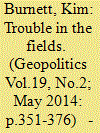

|
|
|
|
|
| Publication |
2014.
|
| Summary/Abstract |
Crisis can create opportunity for change. The 2007-2008 food price crisis has demonstrated that the existing structures of agricultural production and trade lend to food price volatility and renders many of the poorest people around the world vulnerable to food insecurity. Two movements that have raised such contentions over the years are the Fair Trade and Food Sovereignty movements, though in very different ways. My research examines the food crisis and its root causes, and the global governance mechanisms that have emerged in response. It then investigates and analyses whether and how these movements have responded to these new opportunities. The paper argues that engagement by both social movements is crucial to ensuring that the interests of those they represent are considered in the shaping of future governance of global food and agriculture.
|
|
|
|
|
|
|
|
|
|
|
|
|
|
|
|
| 13 |
ID:
082338


|
|
|
| 14 |
ID:
130255


|
|
|
|
|
| Publication |
2014.
|
| Summary/Abstract |
This paper probes some of the global economic forces that have contributed to the ongoing precarious global food security situation, especially in the years since the 2007 to 2008 food crisis. Since the crisis hit at a time when global food production per capita was rising, it is important that policies addressing hunger incorporate dimensions beyond food production. There has been some acknowledgement of the role of global economic forces in the food crisis by global policymakers, but global food security initiatives still largely emphasize increased food production over other measures. The paper concludes that more needs to be done to ensure that the rules that govern the global economy--especially those regarding international trade, finance, and investment--do not work against the goal of food security.
|
|
|
|
|
|
|
|
|
|
|
|
|
|
|
|